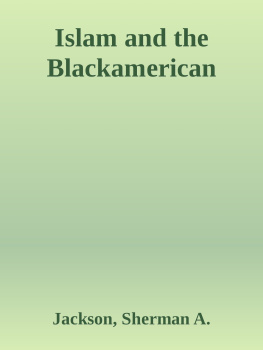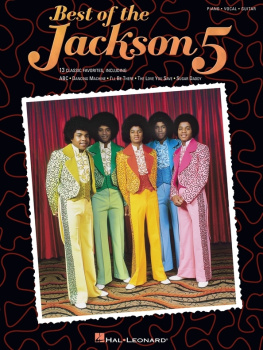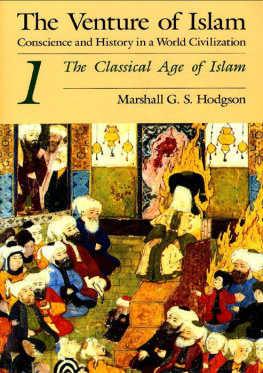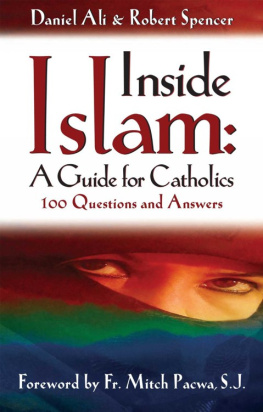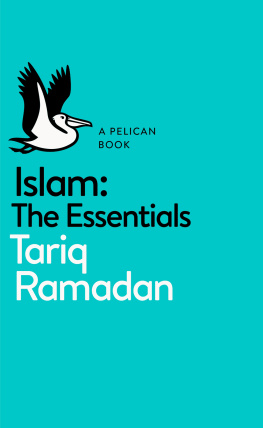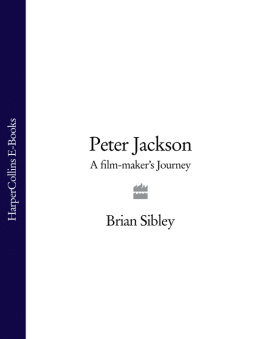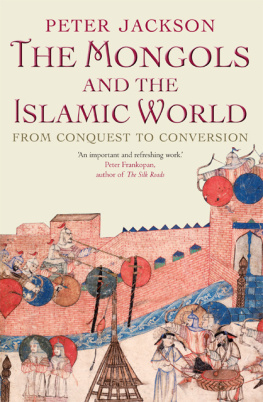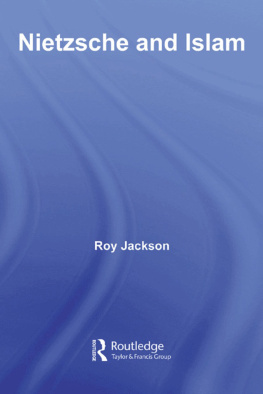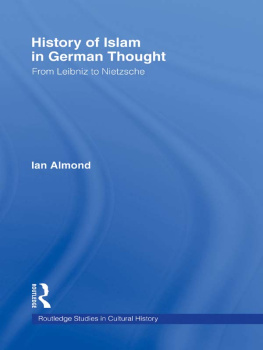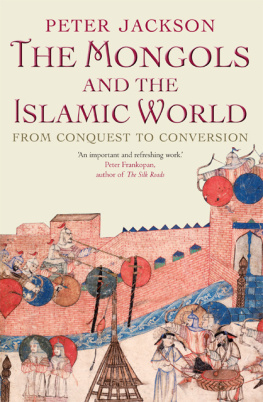Jackson - Islam and the Blackamerican
Here you can read online Jackson - Islam and the Blackamerican full text of the book (entire story) in english for free. Download pdf and epub, get meaning, cover and reviews about this ebook. year: 2015, genre: Religion. Description of the work, (preface) as well as reviews are available. Best literature library LitArk.com created for fans of good reading and offers a wide selection of genres:
Romance novel
Science fiction
Adventure
Detective
Science
History
Home and family
Prose
Art
Politics
Computer
Non-fiction
Religion
Business
Children
Humor
Choose a favorite category and find really read worthwhile books. Enjoy immersion in the world of imagination, feel the emotions of the characters or learn something new for yourself, make an fascinating discovery.
Islam and the Blackamerican: summary, description and annotation
We offer to read an annotation, description, summary or preface (depends on what the author of the book "Islam and the Blackamerican" wrote himself). If you haven't found the necessary information about the book — write in the comments, we will try to find it.
Jackson: author's other books
Who wrote Islam and the Blackamerican? Find out the surname, the name of the author of the book and a list of all author's works by series.
Islam and the Blackamerican — read online for free the complete book (whole text) full work
Below is the text of the book, divided by pages. System saving the place of the last page read, allows you to conveniently read the book "Islam and the Blackamerican" online for free, without having to search again every time where you left off. Put a bookmark, and you can go to the page where you finished reading at any time.
Font size:
Interval:
Bookmark:
Islam and the
Blackamerican:
Looking toward the
Third Resurrection
SHERMAN A. JACKSON
OXFORD UNIVERSITY PRESS
Islam and the Blackamerican
This page intentionally left blank
Islam and the
Blackamerican
Looking toward the Third Resurrection
s h e r m a n a . j a c k s o n
2005
Oxford University Press, Inc., publishes works that further Oxford Universitys objective of excellence
in research, scholarship, and education.
Oxford
New York
Auckland
Cape Town
Dar es Salaam
Hong Kong
Karachi
Kuala Lumpur
Madrid
Melbourne
Mexico City
Nairobi
New Delhi
Shanghai
Taipei
Toronto
With offices in
Argentina
Austria
Brazil
Chile
Czech Republic
France
Greece
Guatemala
Hungary
Italy
Japan
Poland
Portugal
Singapore
South Korea
Switzerland
Thailand
Turkey
Ukraine
Vietnam
Copyright 2005 by Oxford University Press, Inc.
Published by Oxford University Press, Inc.
198 Madison Avenue, New York, New York 10016
www.oup.com
Oxford is a registered trademark of Oxford University Press All rights reserved. No part of this publication may be reproduced, stored in a retrieval system, or transmitted, in any form or by any means, electronic, mechanical, photocopying, recording, or otherwise, without the prior permission of Oxford University Press.
Library of Congress Cataloging-in-Publication Data
Jackson, Sherman A.
Islam and the Blackamerican : the third resurrection / Sherman A.
Jackson.
p. cm.
Includes bibliographical references and index.
ISBN-13 978-0-19-518081-7
ISBN 0-19-518081-X
1. African American MuslimsHistory.
2. African
AmericansReligionHistory.
3. Black nationalismUnited
StatesHistory.
4. African AmericansEthnic identity.
I. Title.
BP221.J34 2005
297.8'7dc22
2004013782
Printed in the United States of America
on acid-free paper
To Nadim Abdul-Ahad,
my Harun

Acknowledgments
The number of people from whose insights, perspectives, and protestations this book has benefited would defy any attempt at a full accounting. I have enjoyed the advantage of the queries and comments of my undergraduate and graduate students at the University of Michigan, the American Learning Institute for Muslims (ALIM), and the many venues around the country to which I have had the honor of being invited to speak. I also benefited from the many long and often contentious discussions outside of mosques and in coffee shops following Friday prayers and at other Muslim get-togethers.
Many of these people had no idea that they were contributing to the present effort. And in many instances I myself would not discover the profundity or relevance of their articulations until long after the fact. In their own way, however, all of these friends, colleagues, and
adversaries have influenced my thinking. And in so doing, they have all contributed to the present work. While many of their names and even their faces may now escape me, I would like to recognize and express my heartfelt gratitude to them all.
Beyond these more anonymous contributors, a number of colleagues in the academy were kind and patient enough to suffer conversations the sole purpose of which was to test some of the ideas I had been contemplating for this book. I would like to mention in this regard Mohammad Fadel, Umar F. Abd Allah, Aminah B.
McCloud, Bruce Lawrence, Charles H. Long, Zareena Grewal,
viii
a c k n o w l e d g m e n t s
T. J. Winter, Omar Abd al-Malik, Sulayman Nyang, and Ebrahim Moosa. To all of them, I am deeply grateful.
This book is dedicated to my brother, Nadim Abdul-Ahad (formerly Marvin T. Jackson), whose encouragement, support, and conscientious engagement have been a constant and indispensable source of strength and inspiration. In Nadim, I could not ask for a better, more loving brother. And it is my hope that he will accept this dedication as a small token of gratitude, love, and recognition for all that he has been and done for me over the years.
Finally, I would like to acknowledge and thank my family, Hassan, Shihab, Saphia, Niyyah, and my wife, Heather, for their sacrifice and their understanding in putting up with methe distracted dad and husbandthroughout the writing of this book.
Contents
This page intentionally left blank
Islam and the Blackamerican
This page intentionally left blank
This book traces the ideological encounter between Islam and Blackamericans, from the proto-Islamic black-nationalist spin-off movements of the early twentieth century through the rise and prepon-derance of orthodox Sunni Islam by the centurys end. While such a trajectory might connote a primarily historical emphasis, this book does not aim at a descriptive survey of the places, dates, and personalities connected with the spread of Islam among Blackamericans.
Its primary focus is, rather, the ideological dislocations and attempted adjustments that accompanied the shift in the basis of religious authority following the influx of Muslims from the Middle East and Asia after the repeal of the National Origins Act and the Asiatic Barred Zone in 1965. It proceeds in the concentric contexts of: (1) the perduring struggle on the part of Blackamericans to settle upon a self-definition that is both functionally enabling and sufficiently authentic; (2) the inextricable power and influence of white supremacy as a seminal feature of the contemporary global cum American sociopolitical order; and (3) the hegemonic presumptions and deployments of modern, Middle Eastern and South Asian Islam, particularly as manifested in the collective vision of Muslim immigrants to the United States.
While commonly treated as the most recent chapter in the story of American immigration, prior to 1965 Islam in America was dominated by an indigenous black presence. With rare exceptions, however, the basis of Blackamerican Islam had been the thoroughly
i s l a m a n d t h e b l a c k a m e r i c a n
American phenomenon of Black Religion, essentially a pragmatic, folk-oriented, holy protest against anti-black racism, an orientation shared with many, though not all, Blackamerican Christians and Jews. But following the settling of critical masses of Muslims from the Muslim world, the basis of religious authority in Blackamerican Islam shifts to the sources, authorities, and interpretive methodologies of historical Islam. On this development, given their presumed mastery over this intellectual legacy, immigrant Muslims came into a virtual monopoly over the definition of a properly constituted Islamic
life in America. Meanwhile, Blackamerican Muslims found themselves increasingly unable to address their cultural, political, and social reality in ways that were either effective in an American context or likely to be recognized as
Islamic in a Muslim one. Like Blackamerican Christians of an earlier era, struggling to find their voice in the context of a Christianity dominated by white Americans, Blackamerican Muslims found themselves struggling to reconcile a dignified black, American existence with the super-tradition of historical Islam, on the one hand, against the presumed normativeness of a historically informed and culturally specific Immigrant Islam, on the other.
All of this would be complicated by the uneasiness with which Blackamerican Muslims related to their own status as Westerners in general and as Americans in particular. On the one hand, their corporate experience as a marginalized racial minority bred a certain diffidence if not hostility toward the idea of embracing America or the West. In fact, the anti-Western sentiment permeating much of Immigrant Islam appeared at first blush to reflect a shared historical perspective between the two groups. This would soon dissipate, however, under pressure of a mutually contradictory relationship to American whiteness. At the same time, the two groups sociocultural interactions, for example, in mosques and Islamic centers, exposed the incongruence of the immigrant claim (and directive) to privilege universal religion over particular-istic culture. Ultimately, this would obviate to Blackamerican Muslims their indebtedness to a cultural and historical legacy that was emphatically domestic, even as they continued to grapple with aspects of the dominant culture in America.
Next pageFont size:
Interval:
Bookmark:
Similar books «Islam and the Blackamerican»
Look at similar books to Islam and the Blackamerican. We have selected literature similar in name and meaning in the hope of providing readers with more options to find new, interesting, not yet read works.
Discussion, reviews of the book Islam and the Blackamerican and just readers' own opinions. Leave your comments, write what you think about the work, its meaning or the main characters. Specify what exactly you liked and what you didn't like, and why you think so.

